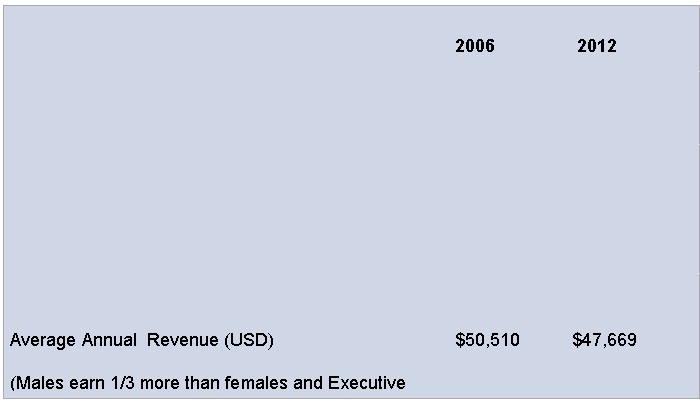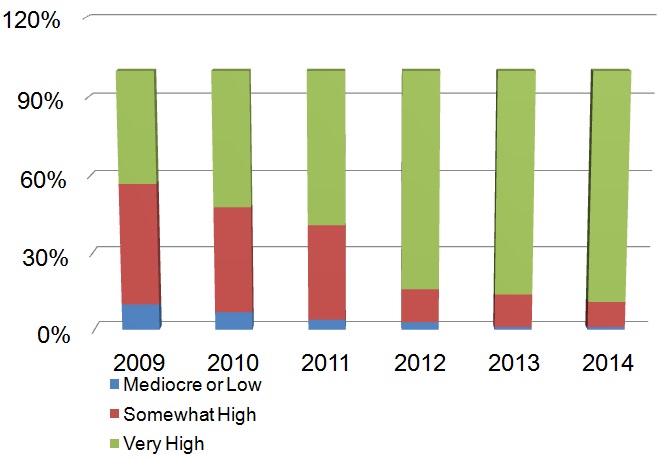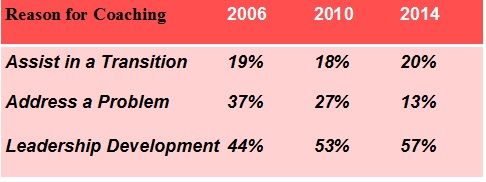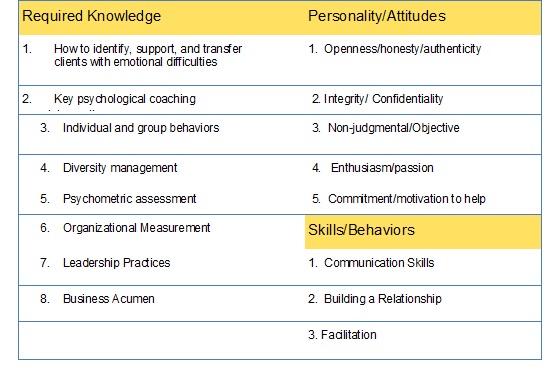Table 2 : ICF, Global Coaching Study 2006 vs 2012
IV – Sherpa Coaching surveys
Sherpa Coaching has been affiliated with many universities over the years, currently with University of Georgia and Howard University.
 Headquartered in Cincinnati, Ohio, USA, Sherpa Coaching is home to world-leading educators and researchers in executive coaching.
Headquartered in Cincinnati, Ohio, USA, Sherpa Coaching is home to world-leading educators and researchers in executive coaching.
They train and certify executive coaches since 2004.
Their research team conduct an annual survey, the largest and longest-running in the industry. Full results are available for free on the website.[6]
9 annual surveys has been conducted between 2006 and 2014 to identify trends in executive coaching. Number of respondents have gone up and down: 550 in 2006; 1292 in 2008; 1050 in 2010; and 845 in 2014.
In the 2014 survey we can fin interesting information and trends of the profession :
- Who gets a coach in organisation : after spreading across all levels of the organisation, coaching is becoming more exclusive and reserved to top executives.
- Demand for coaching, the coaching confidence index CCI[7]. In 2014, the index has taken a significant leap, to arrive at a record high of 166 (2006 = 100)
- The Value of coaching, getting higher from 2009 to 2014.
Sherpa: The Value of Coaching
 Other interesting finding in Sherpa survey is the purpose for executive coaching:
Other interesting finding in Sherpa survey is the purpose for executive coaching:
Who publishes coaching research articles
While reading the literature and especially the bibliography of Stern and Stout-Rostron and the one from Anthony Grant, I made a list of the most active journals in publishing coaching research :
1. Consulting Psychology Journal: Practice and Research. It has been publishing for over
 50 years and has dedicated 5 specials issues to the subject of Executive Coaching in 1996, 2001, 2004, 2005, 2007, and 2008.
50 years and has dedicated 5 specials issues to the subject of Executive Coaching in 1996, 2001, 2004, 2005, 2007, and 2008.
2. Coaching: an International Journal of Theory, Research and Practice. Currently the best coaching journal. Started in 2008.
- The International Journal of Evidence Based Coaching and Mentoring. Started in 2003 also produces good research based articles.
- Coaching Psychologist (since 2005);
- International Coaching Psychology Review (since 2006);
- International Journal of Mentoring and Coaching (since 2003).
What are the most important topics for research in the Field of coaching?
Difficult to answer the question, but I can share what the researchers have suggested:
1. Stern and stout Rostron : 16 areas (Table 1 page 5)
2. Bennett 2010, suggested:
What can we find in a research paper ?
While reading some articles, I came across some interesting researches. Here are the abstracts of few of them.
Area: Coach Characteristics
The debate of whether coaches need a background in psychology to be effective is still going on. Psychology journals say yes while Management and HRD journals usually emphasise organizational and business acumen.
Lai & McDowell (2014) did a literature review of the characteristics needed to be an effective coach[8]. They developed a competency framework with 8 Knowledge Requirements (included both psychological and business acumen); 5 Personal Attributes; and 3 Skills and Behaviors.
Area: Coach/Client relationship
In “What determines helpfulness for clients of coaching?”, de Haan et al.[9], found that “the client values the relationship with and the qualities of the coach, while making little distinction between specific interventions of that same coach”. Listening, understanding, and encouragement from the coach were the behaviors deemed most helpful.
Area: Coaching process
Grant[10] was the first to systemically explore the issues of using a Solution Focused vs. Problem Focused approach in coaching. 225 participants were randomly assigned to SFC or PFC conditions to address real life problems. The study found that SFC had 10X the impact on positive and negative affect; 5X impact on Self efficacy; 2X impact on Goal approach; and produced 23% more actionable steps in their Action plans. However being solution focused does not mean you should be ‘problem phobic’ and never talk about problems.
 My favorite research themes
My favorite research themes
I dedicate the last part of this article to a list of research topics I would appreciate to read about in the near future. Some of them might be difficult to run due to confidentiality and sample sensitivity, but still, I believe there is a way to collect and connect accurate and comprehensive data.
Resources
[1]Grant, A.M. (2011) Workplace, Executive and Life Coaching: An Annotated Bibliography from the Behavioural Science and Business Literature (1st Jan 2011), Coaching Psychology Unit, University of Sydney, Australia
[2]Kauffman, C. M., Russell, S. G., & Bush, M. W. (Eds.). (2008). 100 Coaching Research Proposal Abstracts. International Coaching Research Forum. Cambridge, MA: The Coaching & Positive Psychology Initiative, McLean Hospital, Harvard Medical School and The Foundation of Coaching.
[3]
[4] Dr Lewis stern, Founder and Executive Director, Foundation for International Leadership Coaching; Senior advisor, Institute of Coaching, McLean/Harvard Medical School.
Dr Sunny Stout-Rostron, Director of Sunny Stout-Rostron Associates; Research Advisor, Institute of Coaching, McLean/Harvard Medical School.
[5]L.Stern & S.Stout Rostron : What progress has been made in coaching research in relation to 16 ICRF focus ares from 2000 to 2012. Coaching: an international journal of theory, research and practice.
[6] www.sherpacoaching.com
[7]To calculate the index, Sherpa team considers rates charged by executive coaches, the number of clients they serve, predictions about demand for coaching and the amount of time executive coaches spend in marketing their service, among other factors.
[8] Yi-Ling Lai & Almuth Mcdowal “A systemic review of coaching psychology : Focusing on the attributes of effective coaching psychologists”. International Coaching Psychology Review. Volume 9, n 2 September 2014
[9] Erik De Hann “ Executive coaching in practice : What determines helpfulness for clients in coaching” . Personnel Review. Vol 40:1, 2011
[10] Anthony M.Grant “ Making positive change: a randomized study comparing solution-focused vs. problem-focused coaching questions” Jounal of Systemic Therapies. Vol.31:2, 2012.